The traffic light parties lost significantly in the state elections in Hesse and Bavaria. What lessons do the SPD, Greens and FDP in the federal government draw from this?
There were socio-political issues with which Federal Interior Minister and SPD candidate Nancy Faeser in Hesse, but also Bavaria’s SPD candidate Florian von Brunn, wanted to score points: “Affordable Bavaria”, more affordable housing was advertised, and a better education and health system in Hesse . There was drumming for the SPD’s very own issues.
In the end, the two state candidates were unable to convince. The performance of the traffic light government seemed to overshadow the election campaign too much, and there also seemed to be great disappointment among some voters about the promises from Berlin that could not be kept. Most recently, for example, the 400,000 new affordable apartments per year that Chancellor Scholz promised, but only a small proportion of which were actually built.
Record low for the SPD
Even though Faeser has repeatedly portrayed herself as a state politician with many years of experience in Hesse, she was unable to shed her role as Federal Minister of the Interior and has been under fire in recent weeks because of many debates about migration. Von Brunn was also unconvincing – although the SPD has not played a decisive role in Bavaria for a long time.
At the end of the state elections there is now a record low in Bavaria and Hesse for the Social Democrats – and a contrite government party that had hoped for more. The party wants to process the result, explains SPD party chairman Lars Klingbeil. The aim is to give citizens more orientation. A clear task for the evening – also for the other two government parties.
FDP could want to be louder
The smallest coalition partner, the FDP, did not even invite people to an election party at their federal headquarters. She saves herself TV images of long faces in the Genscher house. The result in Bavaria is “disappointing,” admits FDP General Secretary Bijan Djir-Sarai, but things remain exciting in Hesse. Out of the state parliament in Bavaria, trembling after losses in Hesse – the FDP is in a downward trend.
Because she suffered defeats in all eight state elections since the start of the government with the SPD and the Greens in 2021. Votes were lost everywhere, except in Saarland, where it gained but still did not get into parliament. In Lower Saxony and Berlin she was flown out of parliament after the traffic lights started. At the halfway point of the federal government, the balance sheet for the FDP is bitter: there is not enough tailwind from Berlin for the liberals in the states.
The FDP sought impetus – as has been the case in recent months – by governing and rebelling in Berlin at the same time, as in the dispute over nuclear power or heating. Now the Free Democrats are likely to want to become even more visible and continue to position themselves as a corrective force in the coalition, for example in migration policy against the Greens or against the SPD parliamentary group on industrial electricity prices. On election evening, Djir-Sarai announced to the traffic light partners that the results would be analyzed and discussed. Sounds as if the liberals in Berlin want to become louder rather than quieter.
Greens hope for better cooperation
Green Party leader Omid Nouripour calls the results “stable”. However, the Greens cannot be really satisfied. They had hoped for more, especially in Bavaria. The so-called leaflet affair surrounding the leader of the Free Voters, Hubert Aiwanger, did not give them entry into a coalition, even though the Greens in Bavaria certainly sensed their chance here.
The numbers in Hesse were also disappointing, and top candidate Tarek Al-Wazir makes no secret of this. “All parties involved in the federal government had no tailwind and had to fight uphill,” Al-Wazir told the MR with a view to his own party in the federal government – a fear that the federal Greens had already had in advance.
It was clear that the results of these two state elections would, above all, go home with them. Since the sometimes very dirty dispute over the Building Energy Act with the Liberals, there have been repeated promises to fight less in public. The resolution never lasted long. Whether basic child welfare or questions about migration policy, the Greens continue to clash, especially with the FDP.
Most recently, the Chancellor had to intervene again when the EU asylum package threatened to be blocked by the Greens. When they gave in here, they received heavy criticism from their own ranks: “The Greens are burying their humanitarian principles,” it was said. But how much more can the Greens abandon their own principles in order to maintain peace in the coalition and still hold their own party together? Questions that have not been answered by the Greens even after this election.

